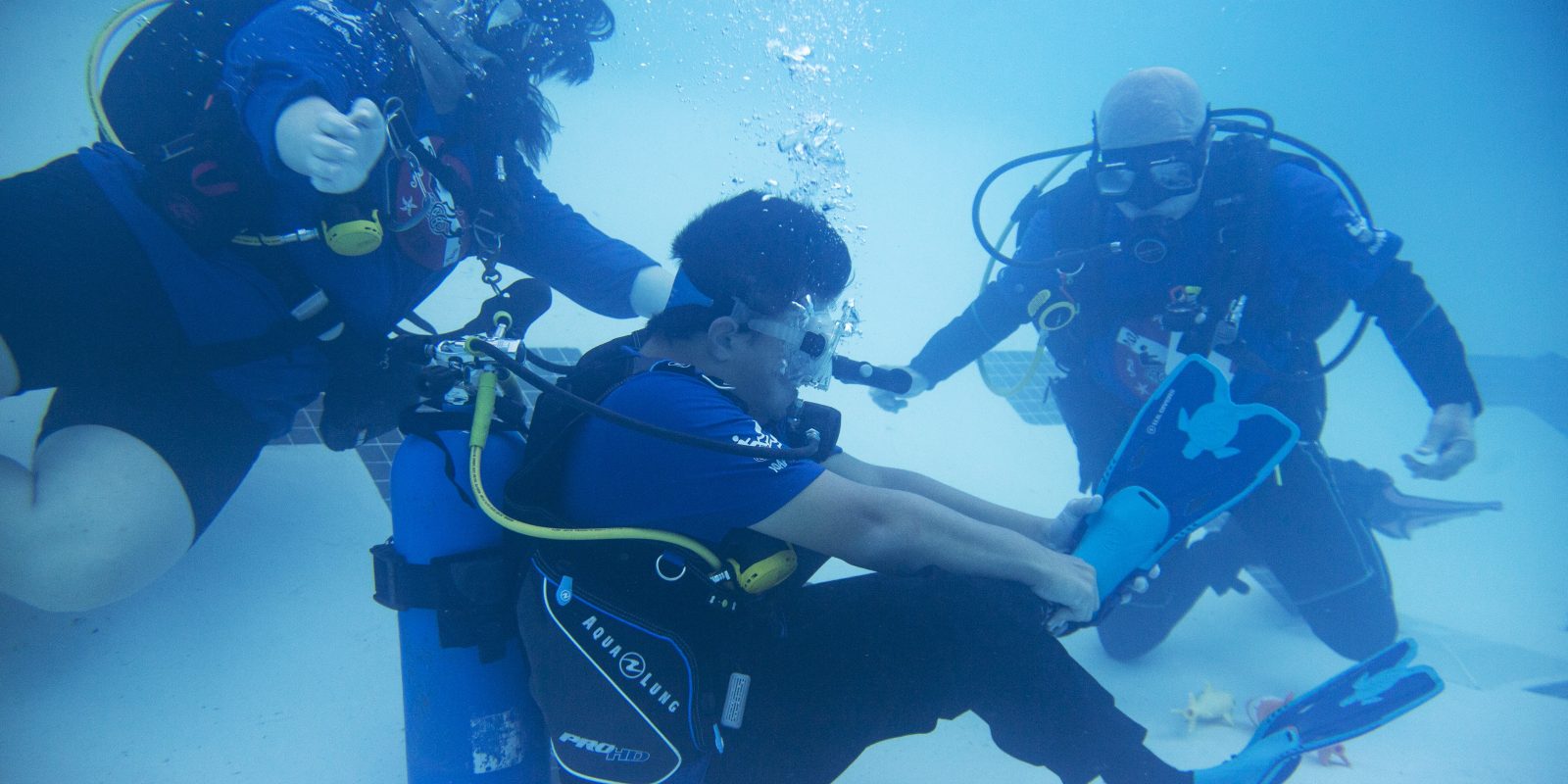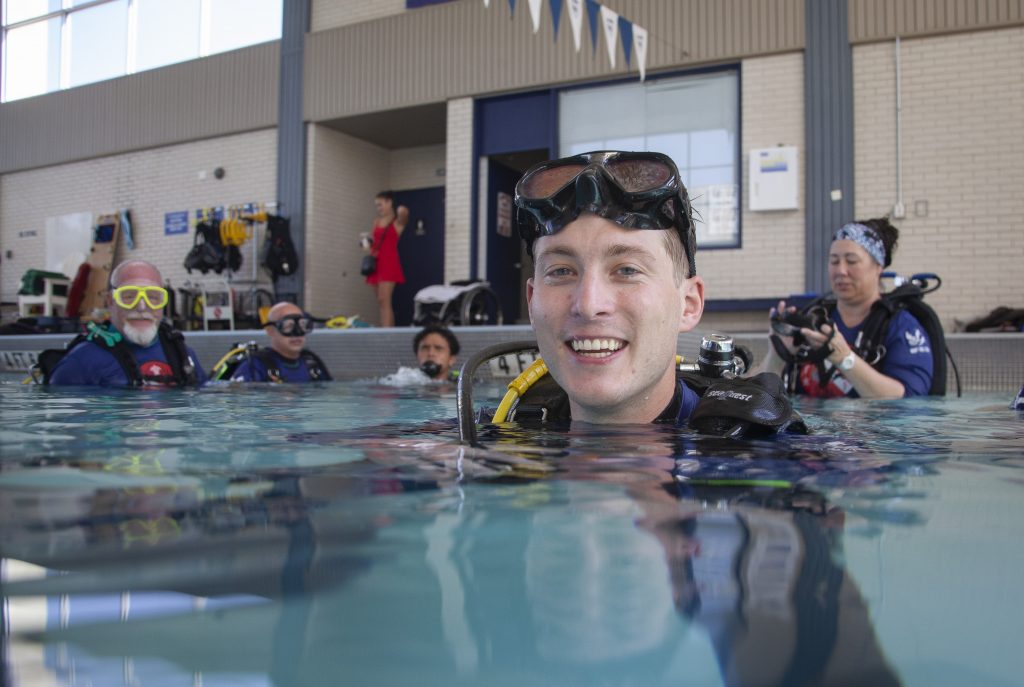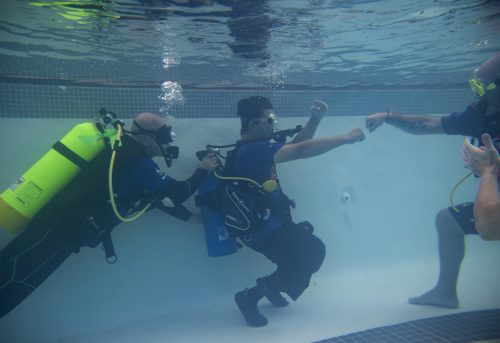
Lisa Selmar, left, and Besher Kuzbari, right, assist handicapped diver Jeremy Perez during an Adapt-Able dive at the Texas Wesleyan Pool in Fort Worth. TCU student Joe Hoyle studied the impact that empathy had on the volunteers.
Deeper Compassion
Joe Hoyle’s capstone project examines the impact of empathy training on scuba volunteers.
AS A STUDENT AT THE ANNE BURNETT MARION SCHOOL OF MEDICINE, Joe Hoyle observed the impact the innovative curriculum made on his experiences with patient care. The school emphasizes the science of medicine and soft skills such as active listening and empathetic communication. Through the Compassionate Practice curriculum, medical students like Hoyle train to provide positive patient interactions, learn stress management techniques and hone skills that foster empathy through everything from role-playing to penning personal reflections.
Every TCU medical student must complete a Scholarly Pursuit and Thesis project before graduating. Hoyle combined his longstanding love of scuba diving with a burgeoning interest in how volunteer work emotionally benefits people. In designing his research project, he partnered with the Handicapped Scuba Association to study the impact of the organization’s empathy training on its volunteers.
Four times a year, the certified professionals volunteering at Adapt-Able Scuba’s Discover Scuba events teach children and adults with disabilities to dive. In September, the volunteers led adaptive divers in above-water training and equipment tests before heading into the indoor pool. The disabled divers spent up to an hour 4 feet to 10 feet underwater, flanked by the pros.
“He is weightless in the water,” said Theresa Adair, mother of 13-year-old Jeremy Perez, who has sacral agenesis, a congenital spinal condition that compels him to use a wheelchair at times. “This is something he’s good at.”
The scuba volunteers who became the subjects of Hoyle’s research worked alongside divers with disabilities including paraplegia and autism. In 2021, the U.S. Census Bureau reported that more than 42.5 million Americans live with some type of disability.

“Neuroscientists have proven that empathy, though it’s a trait that is innate, can be enhanced or improved when you actively flex that muscle to increase it,” TCU medical student Joe Hoyle said.
“I wanted to see whether learning firsthand about the challenges and limitations that the disabled divers faced made an impact on how the dive buddies felt,” Hoyle said. “Neuroscientists have proven that empathy, though it’s a trait that is innate, can be enhanced or improved when you actively flex that muscle to increase it.”
The Handicapped Scuba Association offers empathy training to its volunteers. To measure the impact of that training, Hoyle surveyed volunteers using the Hogan Empathy Scale.
The scale measures social self-confidence, even-temperedness, sensitivity and nonconformity. Participants also answered questions from the newer Perth Empathy Scale, a more comprehensive assessment.
Hoyle’s research explores a bigger question: What part of the experience made the most ongoing impact on the volunteers outside of the pool? He sought to discover whether the volunteers might feel more empathetic in other situations, such as driving in traffic or when dealing with a difficult relative at home because the volunteerism changed their mindset.
He has experienced the impact of empathy training firsthand. The Burnett School of Medicine, he said, expanded his thinking by helping him walk in his patients’ shoes. During his medical studies, he has observed the growth of his own empathic responses.
“Joe really connected with some of the pieces of our mission to treat the patient as a whole person, and that it doesn’t take massive amounts of time and energy to understand your patient isn’t just the heart failure guy in Room 22,” said psychologist Erin Nelson, Hoyle’s thesis adviser and the Burnett School’s assistant dean of physician communication. “His project is such a beautiful example of research that can be generalized to every aspect of human life.”

A scuba-themed capstone project by Anne Burnett Marion Medical School student Joe Hoyle explores the impact of empathy training on volunteers.
Hoyle isn’t the only Burnett student to study empathy.
Kavneet Kaur, who graduated in the first class of medical students in May 2023, looked at the relationship between patient and physician through a lens of perceived empathy. Her abstract posited that physician mental health can impact the quality of care the provider gives patients. She also noted how compassion fatigue, which she defined as “the distress associated with repeated exposure to people who have gone through traumatic life experiences,” is a potential vulnerability for many doctors.
For his part, Hoyle is breaking ground as the first researcher to “measure empathy with scuba instructors,” said Michael Bernas, the director of the Scholarly Pursuit and Thesis program. “Like anything in science, you need proof.”
While the initial survey showed that volunteers did indeed feel more empathy after their work with the disabled divers, the results were less definitive than Hoyle had expected. He said this might be in part because people volunteering to teach disabled populations are empathetic at the outset.
“Sometimes the measures we have aren’t concrete and specific enough to relate to this sort of hands-on work with people with disabilities,” he said, expressing an interest in someday creating an empathy-measurement instrument of his own.
Hoyle also noted that his training as an Empathetic Scholar® influenced his perceptions when it came to learning from those seeking help and care. During his first and second years of medical school, patients spoke to his class about their lived experiences to frame content they were about to study. A teenager with cystic fibrosis made a particular impact on him.
“He spoke very candidly about how much mucus would build up in his lungs and about his infertility,” Hoyle said. “Med school for us wasn’t always preparing for standardized tests and residency. These kinds of experiences shaped our thinking.”

Your comments are welcome
1 Comment
It great to know about this! Congratulation Jou Hoyle!
Related Reading:
The Music of Mexico
Laura Singletary’s deep dive into a high school’s mariachi program spurred the start of one at TCU.
Prescriptions for Chronic Inequities
TCU researchers seek to close gaps in health care access and outcomes for underserved people.